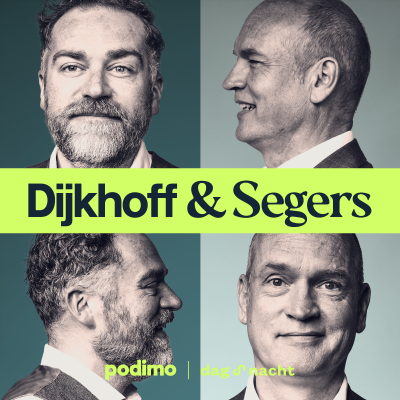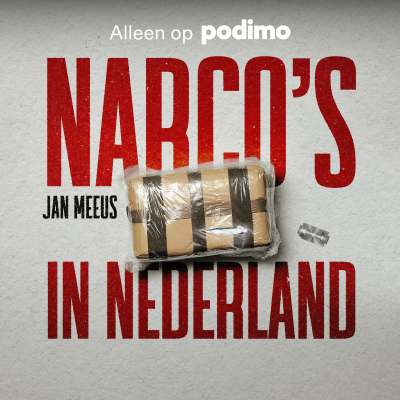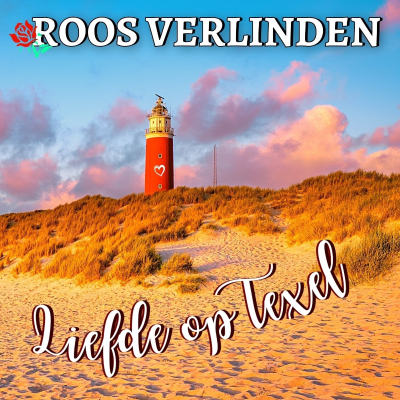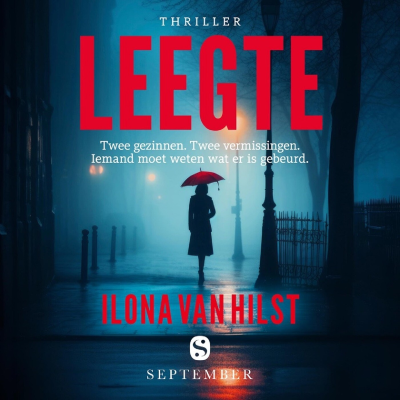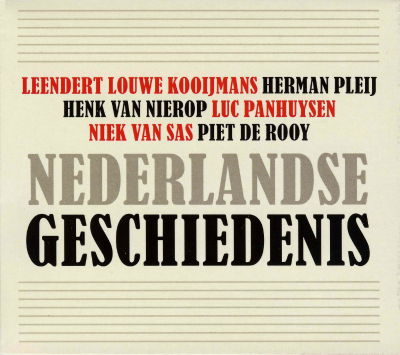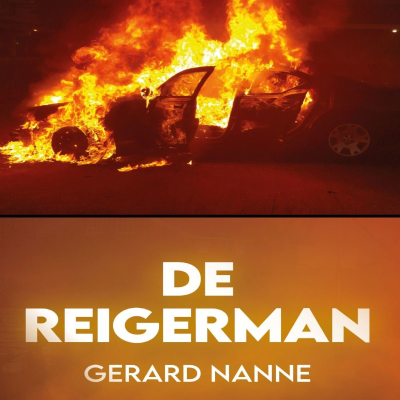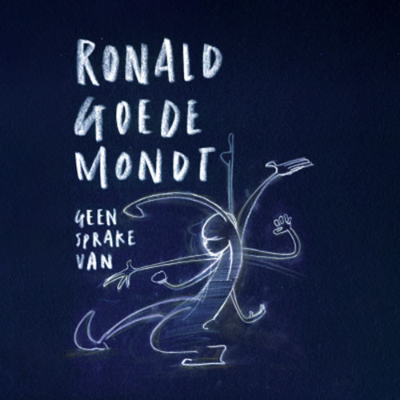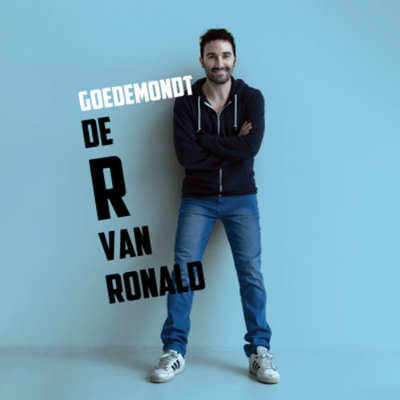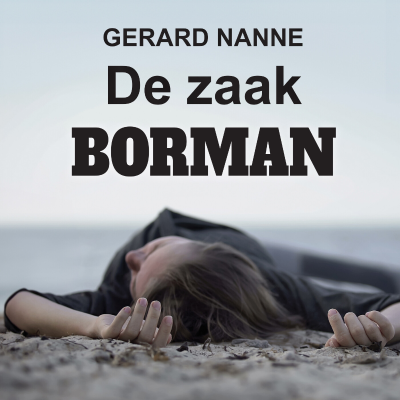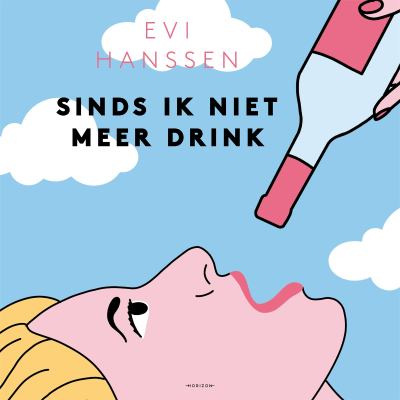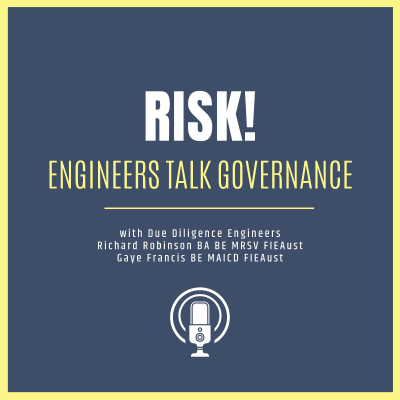
Risk! Engineers Talk Governance
Engels
Technologie en Wetenschap
Tijdelijke aanbieding
2 maanden voor € 1
Daarna € 9,99 / maandElk moment opzegbaar.
- 20 uur luisterboeken / maand
- Podcasts die je alleen op Podimo hoort
- Gratis podcasts
Over Risk! Engineers Talk Governance
Due Diligence and Risk Engineers Richard Robinson and Gaye Francis discuss governance in an engineering context.Richard & Gaye are co-directors at R2A and have seen the risk business industry become very complex. The OHS/WHS 'business', in particular, has turned into an industry, that appears to be costing an awful lot of organisations an awful lot of money for very little result. Richard & Gaye's point of difference is that they come from the Common Law viewpoint of what would be expected to be done in the event that something happens. Which is very, very different from just applying the risk management standard (for example). They combine common law and risk management to come to a due diligence process to make organisations look at what their risk issues are and, more importantly, what they have to have in place to manage these things.Due diligence is a governance exercise. You can't always be right, but what the courts demand of you is that you're always diligent
Alle afleveringen
64 afleveringenSeason 6 Wrap: SFAIRP Complexities
In this episode of Risk! Engineers Talk Governance, due diligence engineers Richard Robinson and Gaye Francis wrap up Season 6 and the theme of SFAIRP complexities. Key season highlights they revisit: * Three essential components of SFAIRP: "As Far", "As Is", and “Reasonably Practicable”, * Confusion around hierarchy of controls, * Contradictions between WHS Legislation (OHS Act in Victoria) and planning and safety law. Watch out for 2026 for Season 7. For further information on Richard and Gaye’s consulting work with R2A, head to https://www.r2a.com.au, where you’ll also find their booklets (store) and a sign-up for their quarterly newsletter to keep informed of their latest news and events. Gaye is also founder of Australian women’s safety workwear company Apto PPE https://www.aptoppe.com.au.
Two Types of Regulators
In this episode of Risk! Engineers Talk Governance, due diligence engineers Richard Robinson and Gaye Francis discuss the two types of Regulators. They outline two fundamentally different regulatory philosophies: regulators who view prosecutions as a measure of success versus those who see them as a measure of failure. The discussion examines how the "so far as is reasonably practicable" (SFAIRP) framework has shifted the burden of proof, making it harder for some regulators to secure convictions and created new challenges for organisations trying to demonstrate compliance. Richard and Gaye analyse recent high-profile cases, including the Auckland Port Authority CEO conviction and the Hazelwood fire prosecution, highlighting how transparency of process, not just outcomes, has become central to regulatory scrutiny. They also discuss the complications arising from overlapping legislation across Australian jurisdictions, the tension between organisations' stated commitment to safety and their legal defence strategies, and how New Zealand appears to be leading the way in prosecuting senior executives. For further information on Richard and Gaye’s consulting work with R2A, head to https://www.r2a.com.au, where you’ll also find their booklets (store) and a sign-up for their quarterly newsletter to keep informed of their latest news and events. Gaye is also founder of Australian women’s safety workwear company Apto PPE https://www.aptoppe.com.au.
Psychosocial Hazards in the Workplace Regulations
In this special episode of Risk! Engineers Talk Governance, due diligence engineers Richard Robinson and Gaye Francis discuss psychosocial hazards in the workplace and the newly introduced Victorian Occupational Health and Safety (Psychosocial Health) Regulations 2025, which came into effect on 1 December. They explain that the new regulations largely re-states existing Occupational Health and Safety legislation requirements to identify, eliminate, and reduce such hazards as far as reasonably practicable. They also note that psychosocial hazards can manifest in various ways, such as aggression, bullying, exposure to traumatic events, and high-demand jobs. However, they argue that many of the hazards listed in the regulations are failed controls. They recommend that organisations break down psychosocial issues into specific mechanisms, such as vicarious trauma, workload stress, and occupational violence, and then develop targeted controls to address those mechanisms, and highlight how high-risk industries, such as marine pilotage and emergency services, that have long-standing practices for managing psychosocial risks. For further information on Richard and Gaye’s consulting work with R2A, head to https://www.r2a.com.au, where you’ll also find their booklets (store) and a sign-up for their quarterly newsletter to keep informed of their latest news and events. Gaye is also founder of Australian women’s safety workwear company Apto PPE https://www.aptoppe.com.au.
Breaking SFAIRP down to three parts: So Far (SF). As Is (AI). Reasonably Practicable (RP)
In this episode of Risk! Engineers Talk Governance, due diligence engineers Richard Robinson and Gaye Francis break down the concept of SFAIRP "So Far As Is Reasonably Practicable" into three key parts: "So Far", "As Is", and "Reasonably Practicable". This was one of their key take-aways from their recent Live Forum where lawyer Joseph Coleiro articulated the following: * "So Far" refers to the notion of doing as much as possible to address a risk, rather than just meeting a target level of risk. * "As Is" refers to the information and circumstances available at the time a decision is made, rather than considering hindsight. * "Reasonably Practicable" is defined in legislation, considering the likelihood and degree of harm, what is known about the risk, the availability and suitability of controls, and the cost associated with implementing those controls. The discussion details a legal case where an organisation was prosecuted for failing to implement various risk controls, demonstrating that negligence often arises from unimplemented, insufficient, or failed precautions. Overall, the key is to break down SFAIRP into these three distinct elements and to not leave out any part, especially when it is fully defined in the Legislation or Act. For further information on Richard and Gaye’s consulting work with R2A, head to https://www.r2a.com.au, where you’ll also find their booklets (store) and a sign-up for their quarterly newsletter to keep informed of their latest news and events. Gaye is also founder of Australian women’s safety workwear company Apto PPE https://www.aptoppe.com.au.
Formal Safety Assessments
In this episode of Risk! Engineers Talk Governance, due diligence engineers Richard Robinson and Gaye Francis discuss Formal Safety Assessments. Key highlights include: * A Formal Safety Assessment (FSA) is meant to provide a logical and reasoned argument that can withstand legal scrutiny. * Formal Safety Assessments should identify the critical issues of concern, the current controls in place, and the further practical controls that could be considered, as well as the reasoning for implementing or not implementing those further controls. * Many FSAs lack this logical reasoning and instead just list risks and general controls, without clearly connecting them to the specific hazards. * Threat barrier diagrams can help provide a logical structure by clearly showing the issues of concern, the controls, and the consequences. * Formal Safety Assessments should be concise and focused, not hundreds of pages long, as the key is to present a clear, robust argument. * Formal Safety Assessments should also be regularly reviewed and updated to reflect changing context and availability of new controls, rather than just being recycled from previous versions. For further information on Richard and Gaye’s consulting work with R2A, head to https://www.r2a.com.au, where you’ll also find their booklets (store) and a sign-up for their quarterly newsletter to keep informed of their latest news and events. Gaye is also founder of Australian women’s safety workwear company Apto PPE https://www.aptoppe.com.au.
Kies je abonnement
Tijdelijke aanbieding
Premium
20 uur aan luisterboeken
Podcasts die je alleen op Podimo hoort
Gratis podcasts
Elk moment opzegbaar
2 maanden voor € 1
Daarna € 9,99 / maand
Premium Plus
Onbeperkt luisterboeken
Podcasts die je alleen op Podimo hoort
Gratis podcasts
Elk moment opzegbaar
Probeer 30 dagen gratis
Daarna € 11,99 / maand
2 maanden voor € 1. Daarna € 9,99 / maand. Elk moment opzegbaar.
